My Top Ten 2018: Blake I. Collier
There’s a compulsion in me that says my inability to see every movie released in a year renders my list futile. It’s just another variation on the “fear of missing out.” As I made this year’s futile list, I recognized a theme of familial trauma. Something about this year has us questioning the nature of what a family is and how the generations affect each other over years. It’s a very Biblical concept that is often neglected in American culture, so it’s nice to finally see it come into the public square. This was a good year for film and—against the general consensus of my peers—a lackluster year for horror. It was bound to happen and I’m fine with that.
#10: What They Had
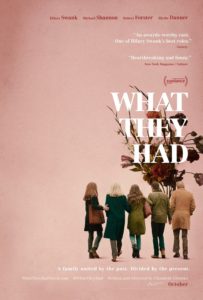 Contrary to what many reviews of this film have stated, there have not been that many films that deal with the struggles of a family dealing with Alzheimer’s and how it simultaneously breaks apart and sews together familial bonds. There have been films about dementia/Alzheimer’s that have manipulated the audience (The Notebook), exploited the disease for scares (The Taking of Deborah Logan), and manufactured a scenario where all resources, finances and medications were available to the family (Still Alice), but none have taken a look at the communal and interpersonal wreckage that the disease can embody for those who have to navigate those inevitably rough ethical, financial, and familial waters. What They Had does this with aplomb and the credit goes both to Chomko’s writing and direction and the film’s excellent cast.
Contrary to what many reviews of this film have stated, there have not been that many films that deal with the struggles of a family dealing with Alzheimer’s and how it simultaneously breaks apart and sews together familial bonds. There have been films about dementia/Alzheimer’s that have manipulated the audience (The Notebook), exploited the disease for scares (The Taking of Deborah Logan), and manufactured a scenario where all resources, finances and medications were available to the family (Still Alice), but none have taken a look at the communal and interpersonal wreckage that the disease can embody for those who have to navigate those inevitably rough ethical, financial, and familial waters. What They Had does this with aplomb and the credit goes both to Chomko’s writing and direction and the film’s excellent cast.
#9: Minding the Gap
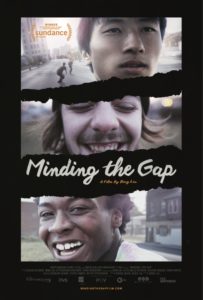 I’m a fairly recent convert to the brilliance of documentary filmmaking. As the years go by, I grow more fond of the genre and intentionally seek out them out. On the surface, a film about skaters would not be on my radar, but I had enough people whom I trust highly recommend this documentary to me and I’m so glad I listened. It hits every nuanced element of its story: race, class, masculinity, transcendence of the sins of the fathers, questions about abuse and corporal punishment, etc. If you aren’t at least a little wrecked and/or moved by the end of this film, then it’s quite possible you are a sociopath.
I’m a fairly recent convert to the brilliance of documentary filmmaking. As the years go by, I grow more fond of the genre and intentionally seek out them out. On the surface, a film about skaters would not be on my radar, but I had enough people whom I trust highly recommend this documentary to me and I’m so glad I listened. It hits every nuanced element of its story: race, class, masculinity, transcendence of the sins of the fathers, questions about abuse and corporal punishment, etc. If you aren’t at least a little wrecked and/or moved by the end of this film, then it’s quite possible you are a sociopath.
#8: The Endless
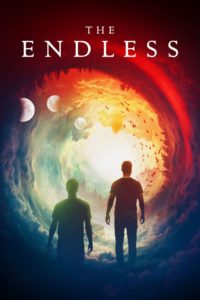 Moorhead and Benson are unique because of their ability to create worlds and then to inhabit them with characters that feel honest. Though there is a direct tie to the world of their first film, Resolution, it is not essential to see either one first to get at the heart and guts of both films. This is really just a film about brotherly love and sacrifice wrapped in the narrative of a UFO cult, an invisible god who resides in the woods, and time travel. It’s a simple marvel to gaze upon.
Moorhead and Benson are unique because of their ability to create worlds and then to inhabit them with characters that feel honest. Though there is a direct tie to the world of their first film, Resolution, it is not essential to see either one first to get at the heart and guts of both films. This is really just a film about brotherly love and sacrifice wrapped in the narrative of a UFO cult, an invisible god who resides in the woods, and time travel. It’s a simple marvel to gaze upon.
#7: Summer of 84
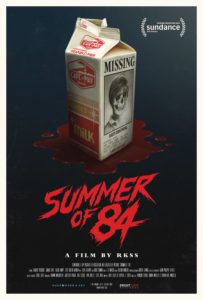 On the surface, this seems like just another 80s retro retread of The Goonies, The Explorers, etc., but to not recognize the subversion that is taking place under the surface of this story is to do disservice to the writing of Matt Leslie & Stephen Smith, not to mention the restrained direction of trio, RKSS (Turbo Kid). While the film heartily imbibes 80s nostalgia, it is decaying the very foundations that our nostalgia is based on. What makes this my favorite horror film of 2018 is how it investigates why we romanticize the past and how that romantic lens lends to the decay of society.
On the surface, this seems like just another 80s retro retread of The Goonies, The Explorers, etc., but to not recognize the subversion that is taking place under the surface of this story is to do disservice to the writing of Matt Leslie & Stephen Smith, not to mention the restrained direction of trio, RKSS (Turbo Kid). While the film heartily imbibes 80s nostalgia, it is decaying the very foundations that our nostalgia is based on. What makes this my favorite horror film of 2018 is how it investigates why we romanticize the past and how that romantic lens lends to the decay of society.
#6: Assassination Nation
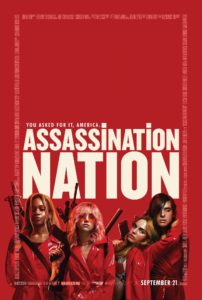 Assassination Nation is the equivalent of a cultural fire-and-brimstone sermon from the pulpit of the disenfranchised to those in power. Smart, stylish, hysterical, and visceral, the film moves from commentary on the age of social media to the ineffectiveness of empty virtue signaling to a dystopian vision which feels potentially possible in the world today. I was enraptured, convicted, and came out of the theater emboldened to find ways to lift up voices that are not being heard.
Assassination Nation is the equivalent of a cultural fire-and-brimstone sermon from the pulpit of the disenfranchised to those in power. Smart, stylish, hysterical, and visceral, the film moves from commentary on the age of social media to the ineffectiveness of empty virtue signaling to a dystopian vision which feels potentially possible in the world today. I was enraptured, convicted, and came out of the theater emboldened to find ways to lift up voices that are not being heard.
#5: Leave No Trace
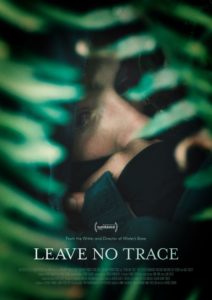 Granik’s depiction of isolation and how cycles of poverty and trauma are passed through generations is heart-wrenching. As we follow a war vet suffering from PTSD (Ben Foster) and his daughter (Thomasin McKenzie) making a life in the woods of Oregon while avoiding notice of the authorities, the audience knows that the isolative utopic existence won’t last forever. When they are found out, seeing the familial bonds bend, on the verge of breaking, is profound and emotionally devastating. Foster and McKenzie’s performances hit the mark in every way. This quiet film will stick with you for days to come.
Granik’s depiction of isolation and how cycles of poverty and trauma are passed through generations is heart-wrenching. As we follow a war vet suffering from PTSD (Ben Foster) and his daughter (Thomasin McKenzie) making a life in the woods of Oregon while avoiding notice of the authorities, the audience knows that the isolative utopic existence won’t last forever. When they are found out, seeing the familial bonds bend, on the verge of breaking, is profound and emotionally devastating. Foster and McKenzie’s performances hit the mark in every way. This quiet film will stick with you for days to come.
#4: First Reformed
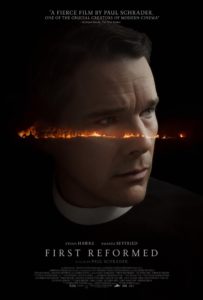 Outside of Calvary’s Father James, Ethan Hawke’s Reverend Toller may be my favorite cinematic representation of the cloth. He is wearied and living in the constant ambiguity of faith and doubt. Schrader’s First Reformed marries metaphor, allusion and existential crisis together in a fever dream. As the film concludes abruptly, one is left with a similar ambiguity: was that final act a death dream, a violent grace interrupting at Toller’s time of need, or a descent into faithless madness? Every person will find a different conclusion. And, yet, it’s the film’s ability to embody these varied feelings that pushes this film high on my list.
Outside of Calvary’s Father James, Ethan Hawke’s Reverend Toller may be my favorite cinematic representation of the cloth. He is wearied and living in the constant ambiguity of faith and doubt. Schrader’s First Reformed marries metaphor, allusion and existential crisis together in a fever dream. As the film concludes abruptly, one is left with a similar ambiguity: was that final act a death dream, a violent grace interrupting at Toller’s time of need, or a descent into faithless madness? Every person will find a different conclusion. And, yet, it’s the film’s ability to embody these varied feelings that pushes this film high on my list.
#3: Three Identical Strangers
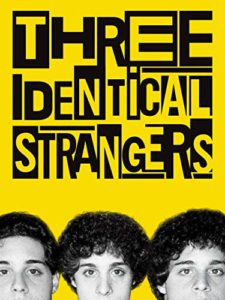 Most people will have the wonderful Won’t You Be My Neighbor? on their list and I am happy to see it get love as well, but in the realm of documentary it is the art of surprise that gets my attention. Not since 2008’s Dear Zachary have I been so arrested by the twists and turns—and their philosophical reflections on the world—of a documentary than this year’s Three Identical Strangers. What starts out as a feel-good story is slowly deconstructed and questioned. The final notes of the film are disturbing and continue to crawl under my skin.
Most people will have the wonderful Won’t You Be My Neighbor? on their list and I am happy to see it get love as well, but in the realm of documentary it is the art of surprise that gets my attention. Not since 2008’s Dear Zachary have I been so arrested by the twists and turns—and their philosophical reflections on the world—of a documentary than this year’s Three Identical Strangers. What starts out as a feel-good story is slowly deconstructed and questioned. The final notes of the film are disturbing and continue to crawl under my skin.
#2: You Were Never Really Here
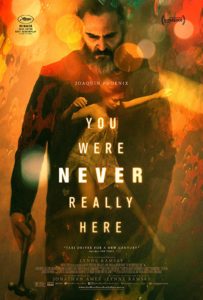 2018 was the year of my discovery of Lynne Ramsay. Earlier in the year, I was simultaneously wowed, depressed and disturbed by We Need to Talk about Kevin. It was not my favorite film, though technically well made, but it made me want to see what else Ramsay had in her arsenal. Enter You Were Never Really Here. For most of the year, it and First Reformed were fighting for my top spot. Yet the film’s poetic tone ultimately seized my heart and mind. Joaquin Phoenix’s turn as a suicidal mercenary for hire is so quietly and compellingly conceived and his journey into the heart of darkness ends with one of my favorite scenes of the year.
2018 was the year of my discovery of Lynne Ramsay. Earlier in the year, I was simultaneously wowed, depressed and disturbed by We Need to Talk about Kevin. It was not my favorite film, though technically well made, but it made me want to see what else Ramsay had in her arsenal. Enter You Were Never Really Here. For most of the year, it and First Reformed were fighting for my top spot. Yet the film’s poetic tone ultimately seized my heart and mind. Joaquin Phoenix’s turn as a suicidal mercenary for hire is so quietly and compellingly conceived and his journey into the heart of darkness ends with one of my favorite scenes of the year.
#1: Manbiki kazoku [Shoplifters]
 It is seldom that a film can come so late in the year for me and climb to my number one spot instantly. Matter of fact, I don’t think that has ever happened. Yet here we are. My first introduction to the work of Kore-eda has become my favorite movie of 2018 and for good reason. This is an intentionally quiet film that explores the threads that make us family even when the same blood doesn’t flow through our veins. All of these characters are deeply flawed, but they are also stuck in a cycle of poverty that isn’t wholly their fault. Yet the love displayed to the orphan, the widow and sojourner by this “made” family is so stunning in its grace, love and mercy. One cannot watch this film without recognizing that family is much deeper than blood.
It is seldom that a film can come so late in the year for me and climb to my number one spot instantly. Matter of fact, I don’t think that has ever happened. Yet here we are. My first introduction to the work of Kore-eda has become my favorite movie of 2018 and for good reason. This is an intentionally quiet film that explores the threads that make us family even when the same blood doesn’t flow through our veins. All of these characters are deeply flawed, but they are also stuck in a cycle of poverty that isn’t wholly their fault. Yet the love displayed to the orphan, the widow and sojourner by this “made” family is so stunning in its grace, love and mercy. One cannot watch this film without recognizing that family is much deeper than blood.


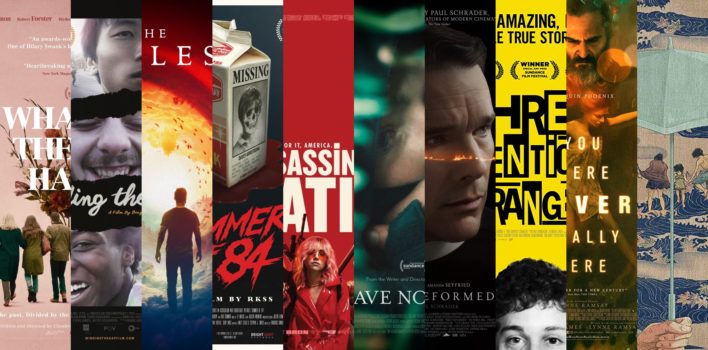
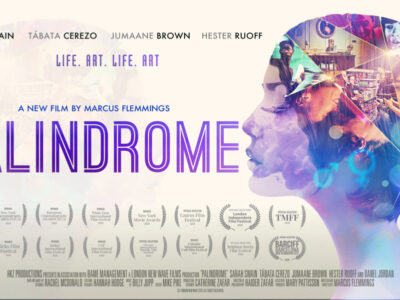
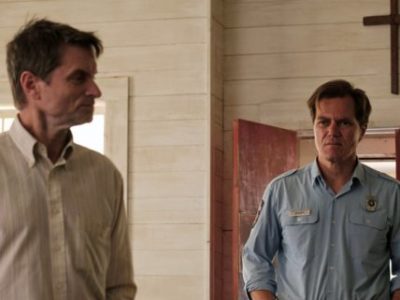
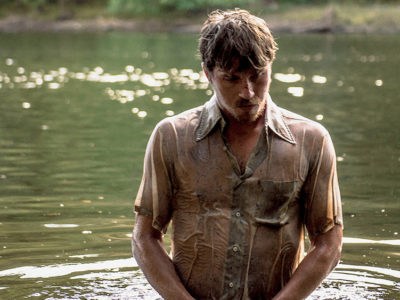


Pingback: My Top Ten 2018: Gene Gosewehr | Reel World Theology
Pingback: My Top Ten 2018: Gene Gosewehr | Reel World Theology